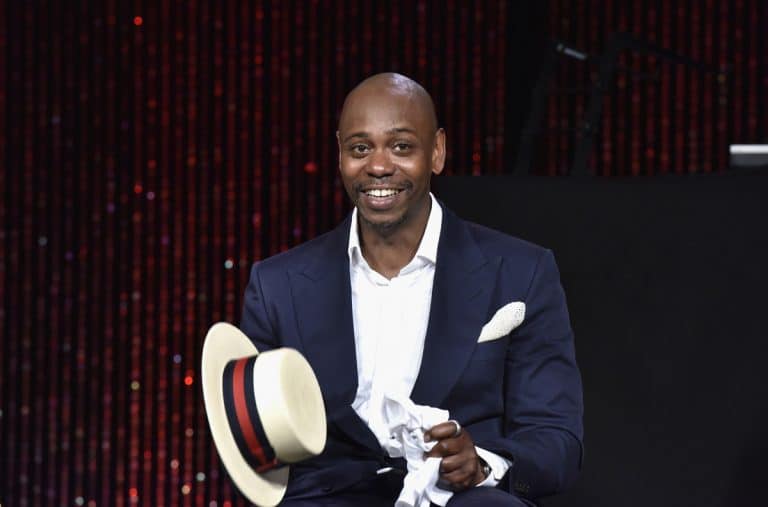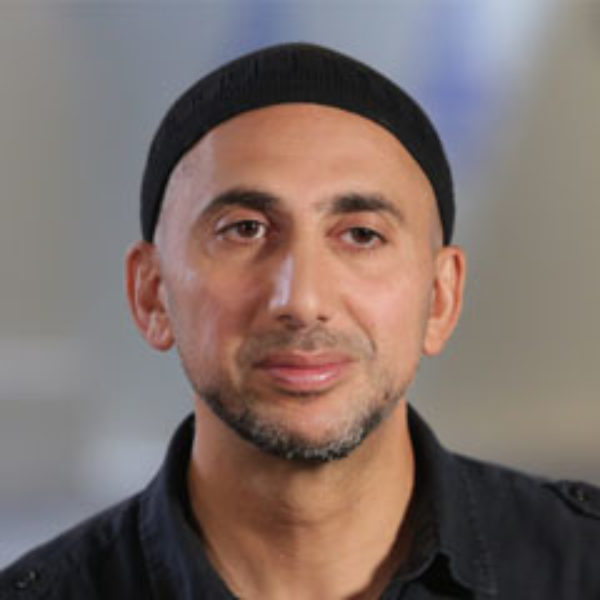
Dave Chappelle speaks on stage at an anniversary party for an arts organization in Water Mill, New York. Image by Eugene Gologursky/Getty Images, © All Rights Reserved.
Dave Chappelle & Muslims as Healers in America
It’s time to acknowledge, celebrate, and support the role of American Muslims as healers in America. This is a role Muslims have been playing in this country long before the prospects of a Trump presidency. Back in 2006, when we were still intimately living with the aftershocks of 9/11, one of the funniest men in America — a Muslim — stepped up. That year, Dave Chappelle released Dave Chappelle’s Block Party, a musical documentary that Jami Bernard from the New York Daily News said “makes you feel so good about America and the people in it, you just want to climb inside the screen and live there.”
Ten years later the same beloved comedian was providentially scheduled to host Saturday Night Live a few days after this bitter election. Through his comedy and commentary, Dave Chappelle again emerged to play the role of healer. The musical guests that night featured a memorable primetime reunion of legendary hip-hop force, A Tribe Called Quest. There you had three celebrated American Muslims on stage — Ali Shaheed Muhammed and Q-Tip from A Tribe Called Quest and Chappelle — in front of audiences still reeling from the aftermath of this painful election cycle.
Among the skits was an all-star cast of old-school Chappelle’s Show characters on their knees preparing to meet their fate before a baseball bat-wielding thug inspired by The Walking Dead. For Chappelle fans, there was a poetic symbolism and comical power in having America’s favorite crack addict (one of Dave’s characters) run around with his disembodied head in hands appealing for unity, mutual understanding, and healing in the country.
Muslims are acutely aware of the fact that most Americans do not see our community as a force for good and healing in this country even while many Muslims understand this to be at heart of our faith. The Qur’an describes itself as a healing and a mercy, and one of the most classic descriptions of the Prophet Muhammad came from a famous 12th-century scholar who titled his text “The Healer.” American Muslims have taken this facet of our faith seriously and it’s evident all over the country for those who care to take notice.
You can find that spirit of healing in the dozens of high-profile artists, comedians, and public personalities like Dave Chappelle who have, through their art, sought to agitate, inspire, and heal. You can find it among thousands of Muslim health providers that staff hospitals and clinics from isolated rural towns to urban centers. You can find it among Muslim organizers and activists working to remedy some of the many lingering injustices and inequities in this country.
You can find the physical manifestation of that healing among the decades-old projects led predominantly by African-American Muslims with deep roots in this country serving as forces for good in fractured, impoverished, and demoralized inner-city neighborhoods. Heroes like the Rock and Roll Hall Of Fame inductee Kenny Gamble, who took his fortune from one of the most successful careers in the industry and spent it rebuilding and fundamentally reimagining large parts of South Philadelphia. While Kenny Gamble, or Luqman Abdul Haq as many Muslims know him, is a special case, his fashion of healing can be found in efforts led by Muslims from Baltimore to the Bay. From Los Angeles’ South Central to Chicago’s South Side, our country is filled with the legacy of Muslims aspiring to be healers in the face of profound racial inequities in some of our hardest-hit neighborhoods.
Some of this has received notice over the years. In Chicago for example, Muslim artist-activist Rhymefest “Che” Smith, best known for co-writing several Grammy Award-winning hits with Kanye West and Common, was recently selected as “the healer” by Chicago Magazine in its annual Chicagoan of the Year edition. In that same city, three of the seven non-profit organizations recently designated by Chicago Ideas Week as “Changing the City for the Better” were led by American Muslims, including the one I’m honored to serve as executive director, the Inner-City Muslim Action Network (IMAN).
In other words, healing is not new for dynamic leaders and efforts in our community. Yet, given the implications of this election, Muslims need to respond by quadrupling down on this work and our fellow Americans must see in it our collective interest to elevate this aspect of our community’s role in the country. We must do this even in the face of policy conversations entertaining Muslim registries, deportation, additional surveillance, and the like. We must rely on a transcendent truth in all of our faiths that challenges us to fight against forces that separate and pit us against one another.
Recently, IMAN helped to commemorate and recall the legacy of Dr. Martin Luther King, Jr. on Chicago’s South Side by building the first memorial to King in the city. Thousands of us from all walks of life gathered on the opening of the memorial to retrace parts of the historic route that King and the marchers led half a century ago. Along with King, we celebrated the legacy of Rabbi Robert Marx, Imam Warith Deen Muhammad, and Reverend Wille Barrow, each of whom worked within their respective traditions of Judaism, Islam, and Christianity to challenge and heal America from the lingering symptoms of racism.
While no community should be saddled with the role of consoling and condoning those espousing white supremacist views, our communities can and should remember the Prophetic model and those like King, Imam Muhammed, and Rabbi Marx, and aspire to challenge and heal our country even when it may not immediately appear to be what everyone wants. King certainly endured a tremendous backlash from those within the larger African-American community who couldn’t understand why he would subject those marching with him to the hate-filled epithets of a community that felt violated and threatened by their very presence.
King knew that daylight was the best remedy for the cancer afflicting the nation, and the racism fueling this fear in Marquette Park was emblematic of a festering wound in the soul of the nation. In other words, beyond protesting things like restrictive covenants, King was on a larger healing mission. Muslims led the process of organizing others to commemorate and renew King’s challenge in Chicago’s Marquette Park because it was precisely that type of sacrifice and vision for a greater collective self-interest that animates our own spiritual and social traditions in this country.
Moving forward, organizing around a broader collective self-interest needs to translate into moving beyond the occasional self-righteous denunciations of prospective allies simply because they don’t know the specific lingo around a certain cause. The “more-revolutionary-than-thou” rhetorical posturing that draws uncompromising lines in the sand between people, communities, and groups who otherwise could come together to be a larger force for healing must end. It must end because it reeks of arrogance and it must end because it will only lead to failure. The American Muslim community can be a practical force for healing in this respect by emulating the great Prophetic model of reconciling the hearts and minds of divided communities and tribes.
We must draw from the inspiration and spirit of so many who have gone before us and, like Malcolm, see in the lofty ideals of our faith a way to mend the persistent and violent residue of racist divisions. Tens of thousands of Americans from all walks of life have embraced the Muslim tradition or engaged with the Muslim community for that reason alone. Those of us active in the American Muslim community know we have a long way to go to fulfill that ideal, but the fact that our spiritual tradition is still looked to as a source of racial reconciliation should be a driving motivation for us all.
If we are going to heal in a Trump America more Muslims will need to join or support their brothers and sisters in this work, and all Americans of good conscience will need to celebrate Muslims as an integral part of our country’s resilience in looking forward.
I’ve met and talked with Dave Chappelle several times over the years and know that he doesn’t always like to publicly identify as a Muslim because, according to Dave, he isn’t the best example or practitioner of the faith. Yet, not all healers are saints. Through tears, laughter, righteous indignation, and hopeful inspiration, Americans must come to see their Muslim brothers and sisters beyond the limited national security framework and appreciate us as healing partners, working in the trenches to more positively and justly re-imagine our country and world.
